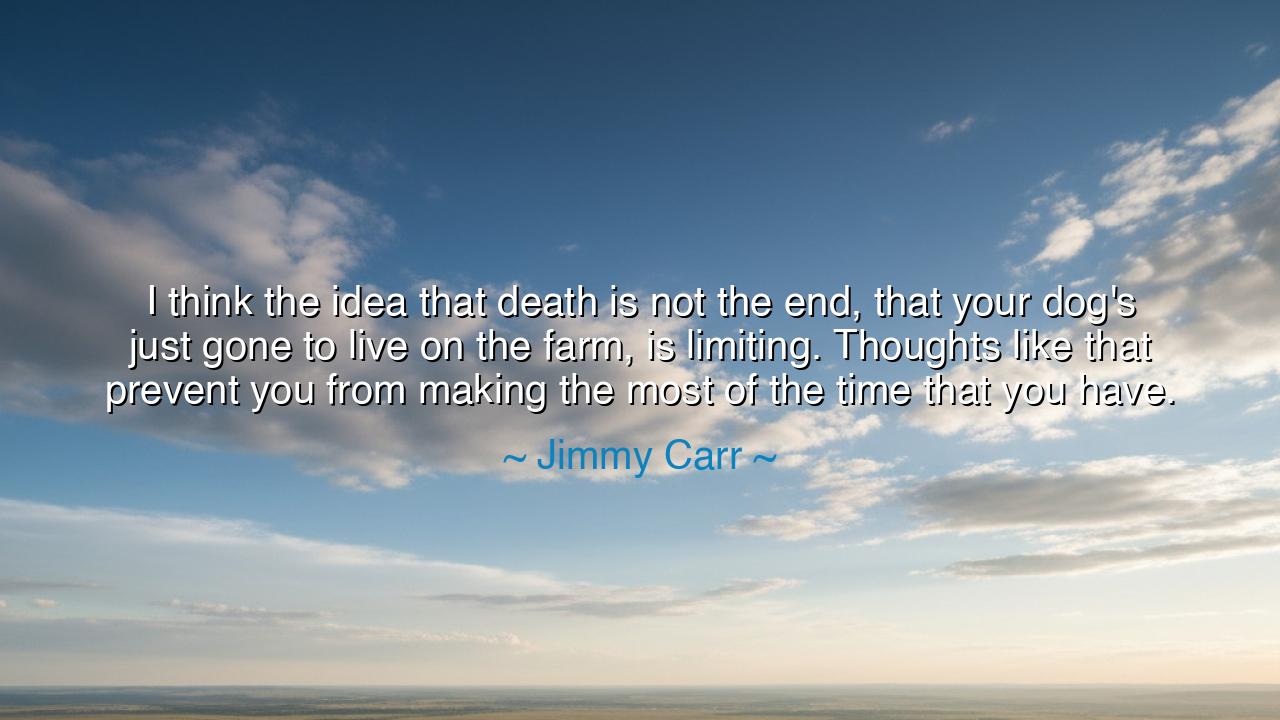
I think the idea that death is not the end, that your dog's just
I think the idea that death is not the end, that your dog's just gone to live on the farm, is limiting. Thoughts like that prevent you from making the most of the time that you have.






In the councils of clear-eyed wisdom, hear Jimmy Carr speak a hard kindness: “I think the idea that death is not the end, that your dog’s just gone to live on the farm, is limiting. Thoughts like that prevent you from making the most of the time that you have.” Though a comedian by trade, he speaks here as a steward of urgency. The ancient teachers would nod: illusions soothe, but they also steal; a soft story about death can hush the alarm that should rouse us to live.
The meaning is double. First, the sentence challenges the narcotic of comforting fables—those phrases we offer children and ourselves to sand down the edge of loss: “gone to the farm,” “in a better place,” “it wasn’t really goodbye.” Carr’s point is not to sneer at consolation, but to warn that denial becomes a chain. If death is “not the end,” if endings never quite end, then the hour in front of us can be postponed, the apology delayed, the adventure deferred. Second, he proposes a stricter mercy: face the finitude of days so that each day burns brighter. When we admit the door really closes, we stop living in the lobby.
There is ancient courage in this. Stoics spoke of memento mori not to darken the mood, but to refine it: remember death so that life becomes concentrated, fragrant, fully awake. Faith traditions—whether they hold to eternity or not—often agree on the practical ethic: the gift of time is precious because it is portioned; only the honest reckoning of limits produces a generous schedule. Carr’s phrase “limiting” is thus paradoxical: it is the refusal to accept limits that limits us; the acceptance of limits that liberates us to action.
Consider a small, true story. A mother, widowed young, told her son that his father had “gone away for work.” For years the boy waited at windows instead of learning the weight and warmth of finality. Only when the truth was spoken—death had come, truly—did the child stop waiting and start living: he wrote the letter he would have sent; he learned the song his father loved; he planted a tree by the doorstep and watered it every Saturday. Ritual replaced fantasy; presence replaced pause. The hard truth made a better child of grief and a better steward of time.
History bears the same lesson in sterner type. After a plague or a war, communities that recover are the ones that do not mythologize the loss away but build with it in view. They set clocks by the brevity of breath: hospitals improved, codes rewritten, neighbors organized. The acknowledgment that endings are real becomes the forge of beginnings that matter. In contrast, cultures that deny the finality of loss drift; policy is postponed, wrongs go unrighted, lifetimes leak through fingers thin as excuses.
What, then, shall we learn? First, let your calendar confess your creed: if death is an end of earthly chances, schedule what love requires—today. Call the older friend. Fix the broken hinge and the broken promise. Second, write a living will and a list of blessings—passwords, stories, recipes, prayers—so that your leaving is an act of care, not confusion. Third, keep a nightly examen of time: name one hour you used well, one you wasted, and one you will redeem tomorrow. Fourth, replace euphemism with tenderness: speak plainly about loss, but pair it with presence—meals brought, hands held, silence kept.
Carry Carr’s cadence like a pocket rule: death, not the end, limiting, make the most of the time. Let it be flint against delay and perfume against despair. If you believe in an afterlife, let that hope make you braver now, not lazier; if you don’t, let that clarity make you kinder faster. Either way, live so that when the last page turns, it finds you mid-sentence in something worthy—unfinished, perhaps, but not unlived. For the wisdom of the elders and the wit of the comic meet here: the truth about endings is the beginning of a fuller life.






AAdministratorAdministrator
Welcome, honored guests. Please leave a comment, we will respond soon